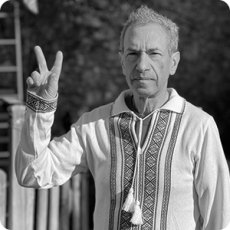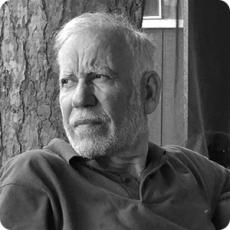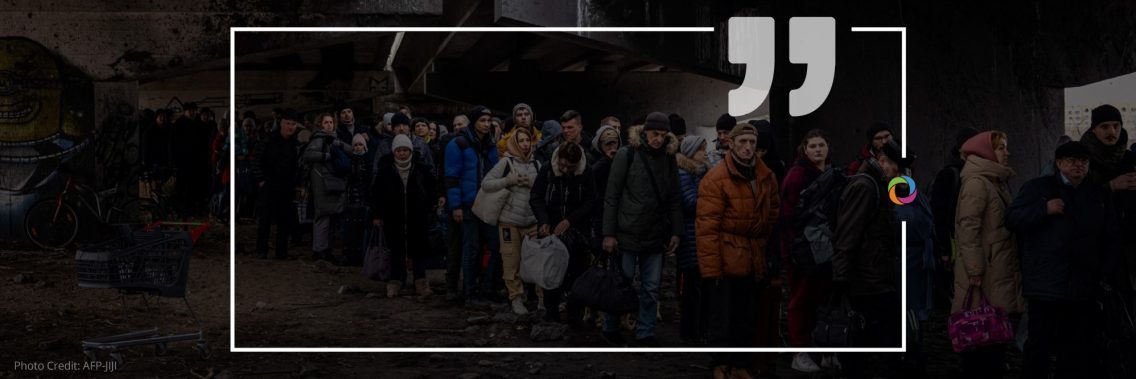The Russian attack on Ukraine and the war that was then unleashed has dominated the news for the last two weeks. As information consumers, we are permanently reminded about the emotions felt by those who wake up to the sounds of explosions and air-raid sirens – ordinary Ukriainians from major cities and smaller, remote villages. The constant threat of being hit by a shell or waking up among the ruins of one’s home may seem remote to us but are, unfortunately, a daily occurance for Ukrainians, of whom more than a million have fled the war zone in under 10 days.
Their destination is mostly the European Union member states of Germany, Spain, Sweden, Poland, and Romania. So far, the EU has opened its arms to welcome the women and children of the biggest country on its Eastern border. But with another 3 million of Ukrainians expected to arrive during the war, is the Union ready for a new refugee crisis?
We asked some experts to share their opinions on this issue.
Key takeaways
-
-
-
-
- More than one million civilians fled Ukraine in just one week after the Russian invasion according to the United Nations. The European Union (EU) estimates that up to four million people may try to leave the country.
- As Ukraine has closed its borders to males aged 18 to 60 who are to join the defence forces, women and children are the main refugees categories.
- Europe is witnessing the most significant migration crisis since 2015 when more than a million migrants arrived on the continent from different parts of the world.
- International experts comment that the EU has reacted promptly to the Ukrainian humanitarian appeal, manifesting solidarity via political, financial, and humanitarian support, by adopting unparalleled positions and by taking unprecedented restrictive measures in response to the Russian hostilities.
- This refugee crisis is different from any other because it involves a nation that is geographically in Europe. Although refugees from outside the continent were sometimes seen unfairly as economic migrants, the Ukrainians are not asking to enter the EU for any reason relating to economic advantage nor do they have any choice but to flee their homes under crossfire.
- Heart-warming displays of volunteering and government goodwill require more sustainable follow-up to address the longer-term needs of both the Ukrainian refugees and those communities that host them
-
-
-
How do you evaluate the EU response to the Ukrainian humanitarian crisis?

“The unfolding events in Ukraine clearly indicate that the world is at a critical juncture when long time archived pages of history seem to be resurfacing showing that essential rights and principles like freedom, democracy, sovereignty, territorial integrity and the rule of law could be transformed into utopian concepts in the blink of an eye. In these tormented times, all nations and international organisations should remain united in the face of aggression like that perpetrated against this European country. The European Union reacted promptly and acknowledged its presence for the Ukrainian humanitarian appeal. It manifested its solidarity with this hard tried nation via political, financial, and humanitarian support, by adopting unparalleled positions, and by taking unprecedented restrictive measures in response to the Russian Federation’s hostilities. While it is obvious that these measures may alleviate some of the harmful consequences of the horrendous events occurring in the eastern part of Europe, it is also clear that these actions will not suffice and that all the efforts of the international community should be focused on reaching as soon as possible a climate of peace and stability in the area by finding the adequate means to put an end to this war that lacks any reasonable justification and causing maybe forever open wounds for the two neighbouring nations.”

“As of March 3, over 800,000 people have fled Ukraine through neighboring Moldova, Romania, Poland, Hungary, and Slovakia borders. Facing sometimes more than one day of waiting for processing, in harsh winter conditions, without water, food, and basic necessities, people have been greeted by volunteers at the border, as well as established associations, that have been providing covers, clothes, and food as well as temporary accommodation and help with the administrative procedures. To focus on the decisions made by the EU, on the 3rd of March the Commission President announced that 500 million Euro will be allocated in humanitarian assistance. A humanitarian hub for Ukraine will be set up in Romania, and assistance at all border crossing points between the EU and Ukraine will be coordinated. Furthermore, as Ukrainians already have the right to stay in the EU without a visa for up to 3 months out of every 6, the Commission has proposed that member states allow those Ukrainians fleeing Russia’s invasion to stay and work in the bloc for an initial two years. The Commission said it would be able at any time to ask member states to extend the protection by one more year or end them if the situation stabilised in Ukraine. If approved, this would be the first time the bloc has activated its 2001 Temporary Protection Directive. This seems a very appropriate and humane way of dealing with the current phase of this crisis. Much more will need to be done in Ukraine itself, once the fighting ends. Huge budgets will be needed for reconstruction but, by that time, it is logical to think that the frozen Russian funds will be put to a good use.”

The European Union response to the Ukraine Refugee Crisis has been generous, strong, and creative. The EU will ask member states to grant asylum to Ukrainian refugees for up to three years, and more than three hundred thousand have entered Poland and Romania at this time, so the final number of refugees will probably be well over four million. If the Ukraine war proceeds as earlier conflicts did, helping women and children leave the war zone will later lead to the desire of the refugees to return home and engage in economic reconstruction – assuming the Russian army and Putin will permit that to happen. As someone who has lived and worked in Kyiv on development assistance and anti-corruption, and a speaker of Russian as well as Ukrainian, I personally would be willing and ready to travel to Poland or Moldova to help the refugees not only with immediate relocation needs but with long-term assistance in the areas of rule of law, education, and economic development.”

“The EU action was swift on every front:
- Humanitarian: the immediate opening of the European borders (including every state with a Ukrainian border) was immediate, humane, and fully expected. Ukrainian refugees were welcomed into the EU with open arms, even if they had no documents;
- Economical response: The EU is playing a key leadership role in unifying the international community. We have never seen such a quick, spontaneous, coordinated, and immediate response. In addition to individual EU member contributions, the Union is providing 93 million Euros in addition to another 193 million Euros (previously committed) to help the internally displaced and Ukrainian refugees;
- The EU sent an immediate message of condemnation to Russia. The EU response was swift: blocking airspace to Russian flights, freezing Russian financial assets (corporate and personal), depriving Russian banks of access to funds, and placing sanctions on the Russian leadership and their controlled businesses. The EU responded in unison and without the usual bickering between states;
- The EU made an immediate commitment to financially help and support Ukraine;
- Political: the flurry of interventions by the EU collectively and by individual states is admirable and is having an immediate impact on the Ukrainian crisis;
- EU Civil Protection Mechanism: the EU is coordinating the delivery of material assistance via the EU Civil Protection Mechanism to Ukraine, with offers from over 20 Member States which includes essential medical care items and civil protection support for 8 million Ukrainians;
- The EU action is having a direct and immediate impact on the ground: There is an agreement between all EU states that a diplomatic and a humanitarian solution needs to be found;
- The EU is supporting the dialogue that is underway between Russia and Ukraine to negotiate an end to the crisis;
- What is still missing is an articulation of a plan that responds to both Ukraine and Russia; a plan that secures Ukraine’s independence as a sovereign country and responds to Russian’s NATO security demands;
- And finally, the EU diplomatic effort must continue to focus on de-escalating the conflict while continuing to help Ukraine maintain its sovereignty and independence.”

“From my experience with the Syrian migration crisis and more recently the Armenian refugee crisis from the 2020 Nagorno-Karabakh war, heart-warming displays of volunteering and government goodwill require more sustainable follow-up to address the longer-term needs of both the Ukrainian refugees and the communities that host them. As in those earlier crises, contention overwork, education, and healthcare, as well as basic services will be a growing cause of tensions. And as in those earlier protracted crises, it will be the mayors who will be the first responders to deal with the social and economic fall-out within their communities. The worldwide attention to this humanitarian crisis provides an opportunity to better prepare for an eventual protracted crisis. The international community can do so by prioritizing support at the local level: capacitating local officials and staff to plan ahead and respond to the needs of a quickly changing community, and by ensuring that local governments will have sufficient opportunities to access social and infrastructure support instruments.”

“Particularly over the last decade, the migratory crisis has been a challenge for the member States of the European Union. Unlike the Syrian migrant crisis of 2015 and more recently the migrant crisis in Belarus, wherein the 27 EU member States showed unequal solidarity in welcoming migrants, there has been a change in Europe’s attitude towards facing the migratory flow caused by the Russian invasion of Ukraine on 24 February 2022. From the first week of the conflict, more than one million people fled Ukraine. While EU rules provide the obligation for refugees to apply for asylum in the first European country they enter, faced with a massive influx making individual assessments impossible, on 4 March 2022, the EU decided to activate the Council Directive 2001/55/EC of 20 July 2001. The purpose of this Directive is to establish minimum standards for giving immediate and temporary protection “in the event of a mass influx of displaced persons from third countries who are unable to return to their country of origin and to promote a balance of effort between the Member States in receiving and bearing the consequences of receiving such persons” (Article 1). Moreover, to deal with the grave humanitarian situation in Ukraine, the EU is also working on various fronts to provide emergency assistance. These measures demonstrate the EU’s firm commitment to solidarity with the Ukrainians.”
How is the Ukraine crisis different from other migration crises?

“Europe is witnessing the most significant migration crisis since 2015 when more than a million migrants arrived on the continent from different parts of the world. The current Ukrainian humanitarian situation is exceptional, the number of refugees fleeing from a European country being unrivaled in recent times. Most of these have found refuge in neighbouring countries west of Ukraine: Poland, Moldova, Romania, Hungary, and Slovakia with other European states being willing to accept migrants as well. Unlike in past crises, Europe is welcoming refugees. This readiness of the European countries to accept migrants might be related to the fact that Ukrainian citizens can already travel to some countries in Europe without a visa and they may be allowed to stay in the country for an extended period (up to 90 days) without special permission and might be also linked to similarities in culture and religion. Special attention must also be given to claims of unequal treatment and alleged acts of violence inflicted by border guards and other authorities to non-native Ukrainian migrants and to ensure that all refugees are treated with the respect of their rights and dignity, regardless of nationality. The gravity of the situation occurring in Ukraine is further proved by the fact that European Union activated the Temporary Protection Directive for the first time in its history so that refugees do not have to go through the standard asylum procedure.”

“While we don’t know for sure how many refugees this crisis will yield, as we are approaching one million but could reach three million or more depending on the fighting, there are a few clear differences from previous migration crises. First is that Ukrainians are not at the present time asylum seekers. They have the legal right to reside for up to 3 months as “tourists” and the Commission is asking member states to extend this period to 2 years, with a right to work within the EU. Secondly, Ukraine has closed its borders to males aged 18 to 60 so the flow of refugees crossing the border is mainly composed of women and children, as males are being drafted, mostly willingly, into civil defense. Finally, there is a Ukrainian diaspora in many EU countries, in particular in Poland, and the flow of refugees is not currently creating any xenophobic reactions, on the contrary. There is a growing and heartwarming effort to provide support in terms of time, finance, and goods, in order to assist those people fleeing an unprovoked and barbaric war.”

Unlike earlier refugee crises, Europe is this time united in sympathy for the people of democratic Ukraine who are essentially the innocent victims of cruel aggression organized by Putin in violation of international law. Although refugees from outside Europe (for example Syrians and Afghans) were sometimes seen unfairly as economic migrants, or even unwanted invaders, it is clear to all that the Ukrainians are not asking to enter the EU for any reasons of economic advantage, nor do they have any choice but to flee their homes. They also intend to return to rebuild their country, if that will be possible after the war.”

This migration crisis is different from any other migration because it involves a nation that is geographically in Europe. Ukraine shares a common border with the EU. The migration that involves a conflict has revived memories of World War 1 and 2. This conflict and the migration crisis exposes fault lines in the EU – a diversity of each EU member’s economic and political interest. The crisis is causing the EU to work on a plan to stop the spread of the conflict to other neighboring countries. The Ukraine crisis will directly impact EU growth and stability. This requires the EU to rethink/develop a strategy that will bring back Russia into the fold while providing Ukraine with the necessary support to ensure its own sovereignty as a democracy based on the rule of law. This migration crisis is unique to the EU because it is caused by another country (Russia) which is a party to the UN Charter, a member of the Council of Europe, the Russia-NATO Founding Act and it is rooted in international legal commitments and obligations. This crisis is unique because it involves one neighboring country using military force without provocation to invade another neighboring country.”

“For the first time, EU countries will have to take care of millions of Ukrainians within the Union’s borders. Is the EU ready for such a large number of migrants? No, it is not. The EU countries spent a large amount of money to support populations and companies during the COVID-19 pandemic. This created a severe burden on member-states’ budgets. In addition to this, now the EU will have to spare a large budget for the Ukrainian migrants as well. This will cause a further problem for EU economies such as the necessity for larger monetary mass which means the central banks of the EU countries will have to print more money. That will inevitably cause higher inflation in the region. So overall, this migration crisis is very different from others because it has many direct negative impacts on the EU member-states. Therefore, the war between Ukraine and Russia has to be stopped urgently.”

The massive offensive of Russian troops in the whole territory of Ukraine is an international armed conflict that comes in the wake of another international armed conflict resulting from the occupation by Russian troops of Crimea since its annexation in 2014. It also comes on top of another non-international armed conflict in the Donbass region where the secessionist territories of Luhansk and Donetsk, which proclaimed their independence in 2014, are located. History has already witnessed conflicts amongst the member States of the Council of Europe in the past, notably in 1974 between Turkey and Cyprus, and more indirectly, during the war in 2020 between the self-proclaimed Republic of Nagorno-Karabakh (or Artsakh), supported by Armenia, and Azerbaijan. However, this time, Europeans are confronted with a war involving, on the one hand, an aggressed country having borders with seven other countries, including four in the EU (Hungary, Poland, Romania, Slovakia), and on the other hand, the world’s second-largest military power and the first nuclear power, with a risk of escalation in the face of the determination – some would say the unpredictability – of the Russian President, Vladimir Putin.
Check out more than 50 job opportunities in the Conflict sector here.

